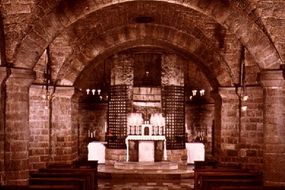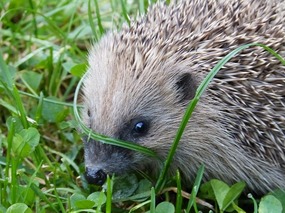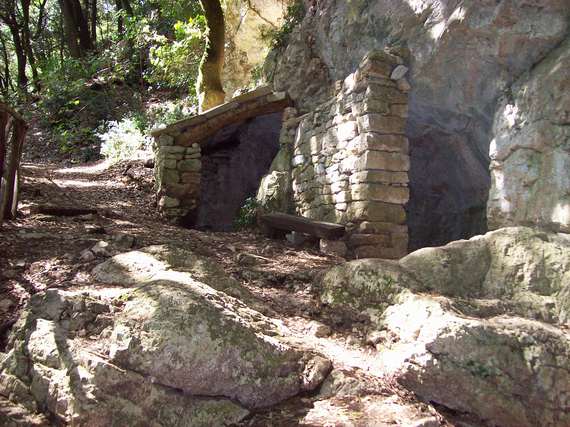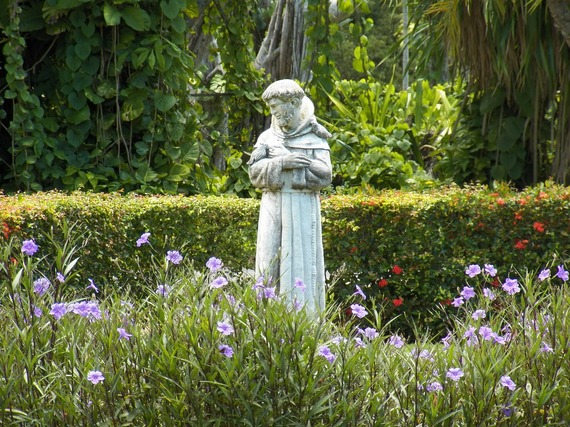One spring morning nearly 20 years ago, I stepped off a bus a short distance from Assisi, Italy. Dressed in khakis and a button-up shirt, I hardly gave the impression that I was an American, so hardly anybody tried to speak English to me as I made my way through the old city to my room at Fontemaggio, where, between Spanish, rudimentary Italian and hand-gestures, I got along just fine. To most people, I was yet another Latin-American backpacker on a walkabout, or maybe a seminarian or devotee of Francis. They thought I was there for the interior life.
Yet I was neither "finding myself" nor on a pilgrimage. I had gone to Europe during a seasonal furlough without a plan and hardly any money, just to see art and architecture, and maybe do a little hiking. Sadly a few months before my visit, an earthquake had nearly destroyed the Cathedral of St. Francis, pulverizing portions of some famous Giotto frescoes that I wanted to see. The cathedral was mostly closed and would take years of restoration.

You could still visit the crypt, and I almost skipped it, having by then seen enough of overwrought, gilded saints' coffins for a lifetime. But I had gown up admiring Francis. He was all about Mother Earth, Brother Sun, herbs and animals. I had already begun my career in the outdoors, so I went downstairs to pay due respect to the Patron Saint of Ecology.
The crypt room was quiet, cool and smelled like damp earth and beeswax. There was nothing frilly about the undecorated stonework, except on the hats of some old women, who were kneeling on the floor and whispering rosaries. It felt more like a grotto than the basement of a cathedral, and unlike any church I had visited in Europe, the place felt sacred. I was so surprised I lit a candle. I knelt among the grandmas...
I'm thinking about that journey, as I watch twitter flurry with thousands of comments about Laudato Si', the encyclical on environment by Pope Francis, whose namesake is St. Francis of Assisi. "Game changer," is a term commonly used to describe the long-anticipated letter. I never imagined seeing the Sierra Club praise the Bishop of Rome, this first Latin-American Pope in History. Even Richard Branson put his two-cents in, tweeting a link to the document, and calling it "a key environmental statement of our time."
Although the outpouring of reactions is surprising, the encyclical's message shouldn't be. St. Francis has been a key figure in Latin-American cultures for centuries. His message runs counter to the history of agricultural, industrial and urban overdevelopment of the Americas and the resulting decay of our natural environment - our home. For many Catholic Latinos, in the prayers of St. Francis, such as the Canticle of Creatures we see our own culturally ingrained devotion to the natural world around us. The Cardinal from Argentina with a chemistry degree chose his name with purpose when he became Pope Francis.
His encyclical, I hope, can help answer hundreds of years of prayers. I hope it can be both catalyst and unifying factor to energize a mass movement towards real work on healing the wounds of industrial development, overconsumption and greed. I hope that the energy of this day of praise carries through the decades it will take to solve the problems that our planet faces because of our reliance upon the energy of fossil fuels.
Yet a few American politicians are trying to counter what the Pope has said. It troubles me that some of loudest ones are Catholics running for President. As practicing Catholics, they're supposed to proffer loyalty to the Holy Father as the Vicar of Christ; a pope's encyclical isn't just some blog or op-ed to dismiss.
It doesn't take a scientist to see that the oppositional views of candidates such as Jeb Bush are a matter of conflicting loyalties-- the green of wealth and the future of corporate profit versus the green of this earth and the future of humankind. Pope Francis has made it clear where he, the Holy Father, is invested.
 For me, this day is a day of recollection. Until I entered the medieval city, St. Francis was nothing more than a concept, a legen, a bulto. After I visited the crypt, I decided to stick around longer, and walk up the mountain to the hermitage where Francis and the original monks retreated. I walked farm roads, and where there weren't signs, there were farmers to point the way. I even saw my first hedgehog.
For me, this day is a day of recollection. Until I entered the medieval city, St. Francis was nothing more than a concept, a legen, a bulto. After I visited the crypt, I decided to stick around longer, and walk up the mountain to the hermitage where Francis and the original monks retreated. I walked farm roads, and where there weren't signs, there were farmers to point the way. I even saw my first hedgehog.
I was somewhat crestfallen to arrive at a bustling pilgrimage site, with many people speaking loudly, and chattering school groups gathered around their teachers and priests. Nobody was visiting the ancient cells, or walking on the trails, preferring rather the civilization of the pretty, villa-like monastery, built two centuries after Francis died. 
The original cells are far different. When I reached few of the stone structures along a natural wall, they seemed more like the most humble ancestral Pueblo dwellings in the southwestern U.S. than anything I would imagine in Europe. Francis and his monks stayed mostly outdoors, among rocks, trees, and water, part and parcel of the natural world around them. It was green, humble, and beautiful. Such a place could inspire anyone to appreciate nature, and care for it just as it provided for them.
It's nice to think that today's encyclical is the legacy of those monks' lives, yet depressing that we have harmed the world so very much in the interim.
I walked around the grottoes and hiked down the ravine, amused that the crowd was missing the treasure, yet thankful that I had that time alone. But I knew I wasn't really alone. As I turned to hike away, the little canyon filled with doves.
